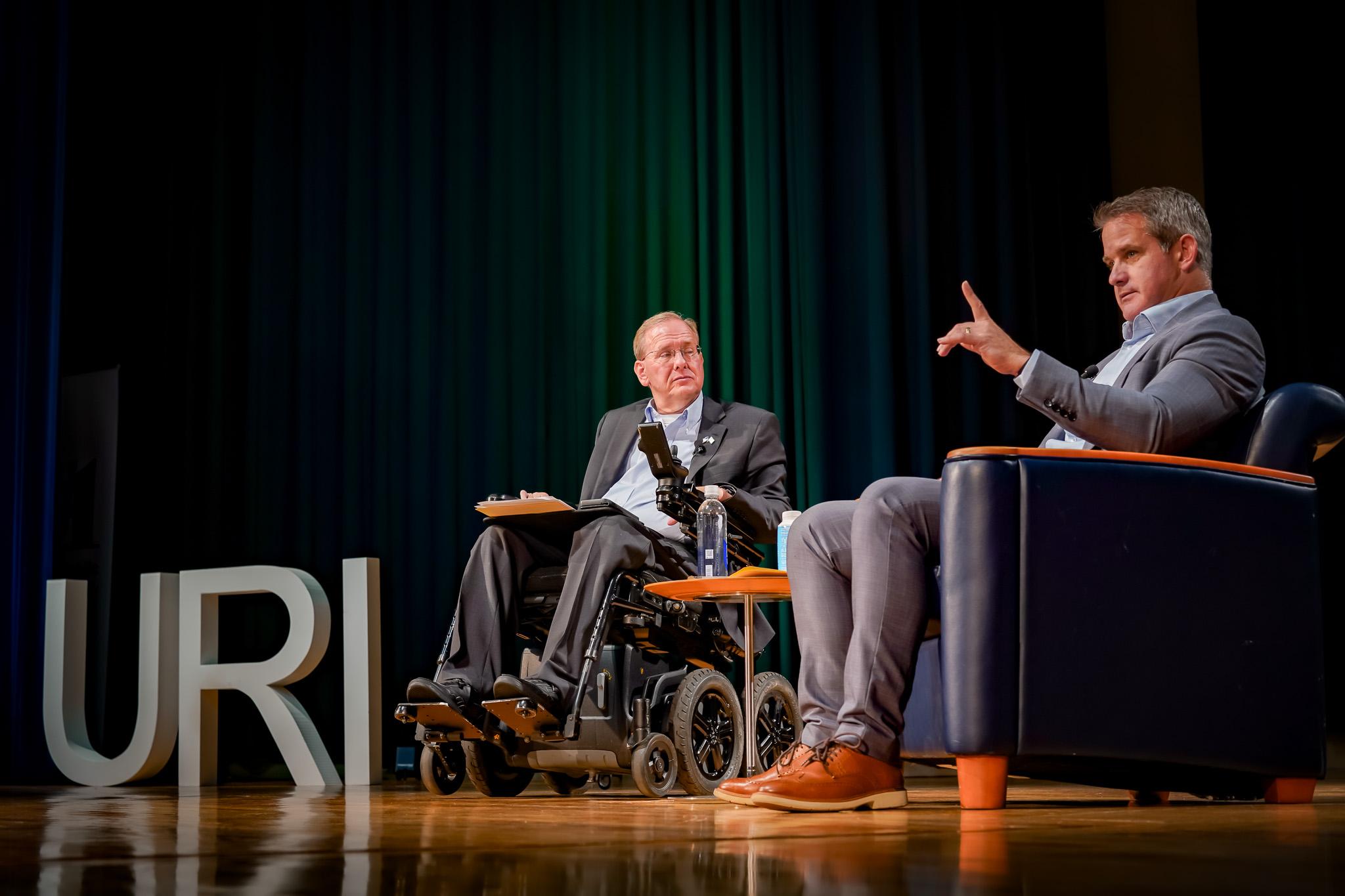As the days tick down to the presidential election, distrust in election security becomes a serious threat, according to former Illinois Rep. Adam Kinzinger.
The University of Rhode Island welcomed Kinzinger to speak as part of the honor’s colloquium, Democracy in Peril, on Tuesday, co-hosted by former Rhode Island Rep. James Langevin.
The Republican congressman rose to prominence after being one of 10 in his party to vote to impeach former President Donald Trump in 2021. On Tuesday, Kinzinger voiced his concern of political division allowing for the potential rise of facism.
Political involvement on social media has allowed for people to seek belonging in political identity, Kinzinger said. If one has to bend their ethical and political beliefs to be “part of the club,” so be it.
Exploitation of the general public’s fear among politicians and media outlets has become a way to secure power and attention, according to Kinzinger. The congressman compared fear to a wildfire that those in power have lost control of.
“I think we let this fire burn out of control and now the fire controls us,” Kinzinger said.
Kinzinger gave an account of his experience on Jan. 6, 2021, during the attacks on the United States Capitol. After looking through Twitter (now X), Kinzinger knew there would be violence. He described taking his gun to his office for the first time and telling his staff not to come in.
“I have never felt this in my life before, and I’ve been to war – I just felt an immense darkness that fell over the place that I can’t explain,” Kinzinger said.
After the attacks, Kinzinger believed that Republicans would be united in dropping Trump from the party.
“The assumption was we’re going to flush Trump down the toilet,” Kinzinger said. “He’s done.”
However, once political winds changed, Republicans changed their minds, Kinzinger said. Langevin gave props to Kinzinger for his courage to go against the party grain, which Kinzginer shrugged off.
“I really don’t feel like I was courageous,” Kinzginer said. “I just felt like I was surrounded by cowards.”
When speaking about his decision to go against the Republican majority, Kinzinger choked up describing a future conversation with his son about standing up for his beliefs.
“If he Googles my name and sees that I didn’t do that when faced with that, I couldn’t live with myself,” Kinzinger said.
Kinzinger said his biggest concern was a distrust in election security and validity. The only thing democracy needs to survive is a trust and understanding of elections, which he described as the “rules of the game.”
When politicians sow doubt in election validity, voters feel their vote was taken from them, Kizinger said.
“Against all those facts, people choose to believe the system doesn’t work,” Kizinger said. “That’s fascist.”
In the upcoming election, everything is at stake, Kinzinger said. Government institutions functioned as a guardrail during the first Trump administration, but they couldn’t take another hit and remain standing.
After the 2020 election, Trump approached the Department of Justice and asked them to say the election was corrupt, Kinzinger said.
“He said to them, ‘I’m not asking you to invent corruption, I’m just asking you to say the election was corrupt and leave the rest to me and the Republican congressmen,’” Kinzinger said.
As for a potential presidential victory for Vice President Kamala Harris, Kinzinger is more optimistic. While he doesn’t agree on all her policies, Kinzinger said he appreciates her toughness in foreign affairs.
Kinzinger warned young men in the audience of looking to Trump as a model of masculinity.
“Masculinity is okay,” Kinzinger said. “What is masculinity? It’s standing up for the defenseless. It’s punching up. It’s fighting for the people you love.”
In terms of foreign affairs, Kinzinger referred to the U.S. conflict with Russia as “asymmetrical warfare.” While Russia could take certain actions against the U.S., if the U.S. were to do the same, it would be compromising their morals.
Ending the discussion, Kinzinger and Langevin encouraged students to get out and vote.





